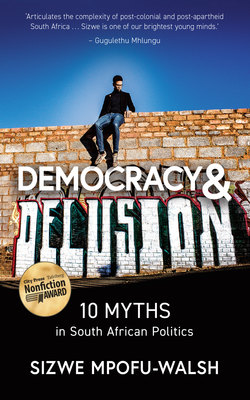Читать книгу Democracy and Delusion - Sizwe Mpofu-Walsh - Страница 4
На сайте Литреса книга снята с продажи.
Introduction
ОглавлениеTwo decades of rainbow mythology have soothed South Africa into a state of chronic complacency. We were sold a lie: that the vote would resolve our country’s fundamental problems, if we only had the patience to wait. Somehow, over the past two decades, we’ve replaced a vision for dramatic social change with another soaked in the ‘tranquilising drug of gradualism’.1 Today, South Africans are confronted with an ironic problem: appreciating the scale of our country’s problems. This book argues that we require a painstaking reappraisal of the first two decades of so-called ‘freedom’ in South Africa; a hard look at the image staring back at us. To move forward, we must have the courage to scrutinise our situation anew. We must break free from the comforting confidence of orthodoxy. Only then can we begin the long and difficult struggle for a deeper freedom in the future.
Deeply conservative dogmas are holding South Africa back. They transcend traditional political divides, and enjoy wide dissemination through a sophisticated infrastructure of power. Confusingly, these creeds are draped in the language of ‘liberation’, ‘non-racialism’, and ‘prosperity’, while serving the interests of the narrowest elite. They can be summarised in ten myths which, together, constitute South Africa’s democratic delusion.
I will tackle the deconstruction of these myths in this book, and also in the companion rap album of the same name. For each of its chapters, there is a corresponding song. Combining a classic and traditionally esteemed form of expression – the essay – with a contemporary one – hip-hop – is emblematic of the myriad and seemingly paradoxical forces that bind South Africa today. Music can capture the discordant emotion of modern South African life, but it can’t always parse its nuances. Only writing can do that.
In one sense an ‘essay’ – from the Old French essai – is an ‘attempt’ or ‘stab at’ something. A deeper look reveals that the French derives from the Latin exagium, meaning ‘weigh’ or ‘weight’. One root of exagium is agere, which literally means to ‘set in motion’ – as the tongue of a balance scale moves when weight is applied to one of its sides.2 The writer and historian Teju Cole makes the same point from a different perspective. He suggests the purpose of an essay is not to settle a debate, or to ‘give one’s take’ on a question, but to bring once-disconnected thoughts into a new, coherent conversation. The best essays, according to Cole, bring diverse ideas ‘into the same room’.3 Essays are both endings and beginnings. Their true value is not in resolving conversations; it’s in triggering them. That’s the aim of this book: to set in motion a fresh conversation about South African politics.
Writing this book in the tumultuous period between 2014 and 2017 has been bewildering. I’ve scratched my head, laughed, and cried – sometimes at the same time. In a 24-hour news cycle, depth is often sacrificed in favour of novelty. This allows and perpetuates a kind of collective political amnesia as room is constantly made for the next new story. In all this confusion, a clearheaded analysis of the South African situation is all the more urgent. Not everything can be captured in a tweet. Even if it could, it would disappear in two hours, buried in plain view at the bottom of a million timelines. This book is not just a collection of essays, but a reference guide. One that sorts through the information we’re all swimming in, and separates the vital from the trivial. The themes I explore here – the ideas I bring into this room – will be with us for a long time to come, even if the events through which I examine them are contingent and fleeting as part of the fast-paced news cycle.
One thing is certain: the time for gentle persuasion has long since passed. Though what follows is designed to be provocative, I hope you will suspend outrage long enough to give it a fair hearing.
